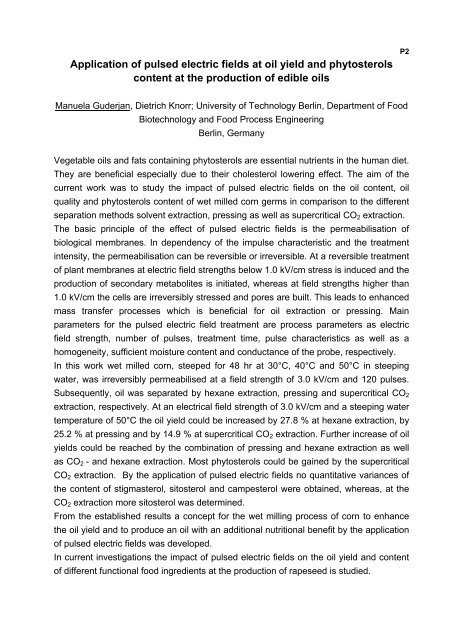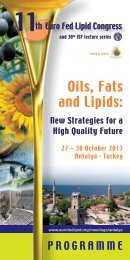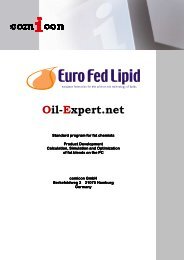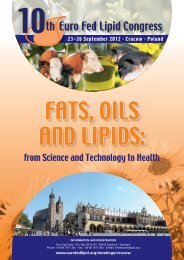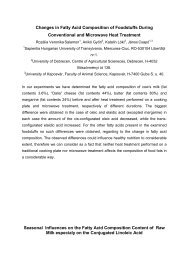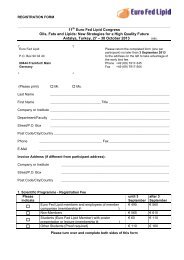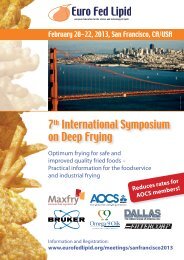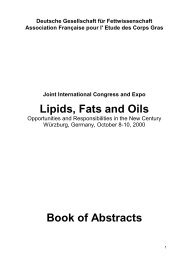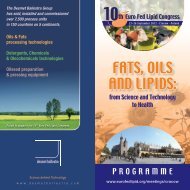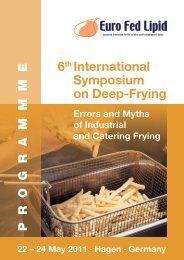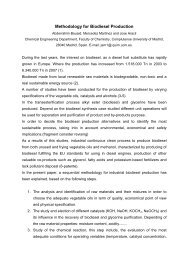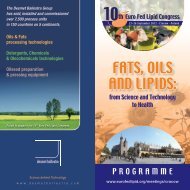Abstracts now available online - Euro Fed Lipid
Abstracts now available online - Euro Fed Lipid
Abstracts now available online - Euro Fed Lipid
Create successful ePaper yourself
Turn your PDF publications into a flip-book with our unique Google optimized e-Paper software.
Application of pulsed electric fields at oil yield and phytosterols<br />
content at the production of edible oils<br />
Manuela Guderjan, Dietrich Knorr; University of Technology Berlin, Department of Food<br />
Biotechnology and Food Process Engineering<br />
Berlin, Germany<br />
Vegetable oils and fats containing phytosterols are essential nutrients in the human diet.<br />
They are beneficial especially due to their cholesterol lowering effect. The aim of the<br />
current work was to study the impact of pulsed electric fields on the oil content, oil<br />
quality and phytosterols content of wet milled corn germs in comparison to the different<br />
separation methods solvent extraction, pressing as well as supercritical CO2 extraction.<br />
The basic principle of the effect of pulsed electric fields is the permeabilisation of<br />
biological membranes. In dependency of the impulse characteristic and the treatment<br />
intensity, the permeabilisation can be reversible or irreversible. At a reversible treatment<br />
of plant membranes at electric field strengths below 1.0 kV/cm stress is induced and the<br />
production of secondary metabolites is initiated, whereas at field strengths higher than<br />
1.0 kV/cm the cells are irreversibly stressed and pores are built. This leads to enhanced<br />
mass transfer processes which is beneficial for oil extraction or pressing. Main<br />
parameters for the pulsed electric field treatment are process parameters as electric<br />
field strength, number of pulses, treatment time, pulse characteristics as well as a<br />
homogeneity, sufficient moisture content and conductance of the probe, respectively.<br />
In this work wet milled corn, steeped for 48 hr at 30°C, 40°C and 50°C in steeping<br />
water, was irreversibly permeabilised at a field strength of 3.0 kV/cm and 120 pulses.<br />
Subsequently, oil was separated by hexane extraction, pressing and supercritical CO2<br />
extraction, respectively. At an electrical field strength of 3.0 kV/cm and a steeping water<br />
temperature of 50°C the oil yield could be increased by 27.8 % at hexane extraction, by<br />
25.2 % at pressing and by 14.9 % at supercritical CO2 extraction. Further increase of oil<br />
yields could be reached by the combination of pressing and hexane extraction as well<br />
as CO2 - and hexane extraction. Most phytosterols could be gained by the supercritical<br />
CO2 extraction. By the application of pulsed electric fields no quantitative variances of<br />
the content of stigmasterol, sitosterol and campesterol were obtained, whereas, at the<br />
CO2 extraction more sitosterol was determined.<br />
From the established results a concept for the wet milling process of corn to enhance<br />
the oil yield and to produce an oil with an additional nutritional benefit by the application<br />
of pulsed electric fields was developed.<br />
In current investigations the impact of pulsed electric fields on the oil yield and content<br />
of different functional food ingredients at the production of rapeseed is studied.<br />
P2


